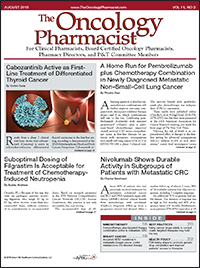
In the August issue of The Oncology Pharmacist (TOP), we feature results of a clinical trial presented at the 2018 American Association for Cancer Research meeting, which showed that the addition of the immune checkpoint inhibitor pembrolizumab to chemotherapy yielded significantly longer overall survival and progression-free survival compared with chemotherapy alone in patients with newly diagnosed metastatic nonsquamous non–small-cell lung cancer (click here to view).
“Halving the risk of death is an unprecedented effect of therapy in the first-line setting for advanced nonsquamous NSCLC without EGFR or ALK alterations,” Leena Gandhi, MD, PhD, Director, Thoracic Medical Oncology Program, Perlmutter Cancer Center, NYU Langone Health, New York City, told attendees.
This issue also features highlights of key presentations and studies from other national and international meetings, including the 2018 Multidisciplinary Head and Neck Cancers Symposium, the 2018 National Comprehensive Cancer Network Annual Conference, the 2018 Gastrointestinal Cancers Symposium, and the 2018 combined meeting of the Association of Community Cancer Centers and the Cancer Center Business Summit.
A presenter at the 2018 Gastrointestinal Cancers Symposium discussed the results of a phase 2 trial showing the benefit of dose escalation in patients with metastatic colorectal cancer who are treated with regorafenib, an important finding because the toxicity profile of this drug has limited its use (click here to view).
“The premise of the study was to understand if we started at a low dose with close follow-up and went to a dose-escalation scheme, and whether or not that would improve tolerance. We saw a doubling of the patients who were able to take it into cycle 3,” noted Daniel H. Ahn, DO, MS, Division of Hematology/Oncology, Mayo Clinic, Phoenix, AZ.
At the 2018 Multidisciplinary Head and Neck Cancers Symposium, Jeremy P. Harris, MD, MPhil, Resident Physician, Department of Radiation Oncology, Stanford University, San Francisco, presented results of a retrospective analysis showing that the time from surgery to the start of radiation therapy may affect outcomes in patients with head and neck cancer (click here to view).
“When compared to a 42-day delay, a shorter interval between surgery and the start of radiation did not necessarily infer statistically significant benefit to OS, but a prolonged delay resulted in worse survival, which became significant starting at 49 days,” Dr Harris told attendees.
In addition to conference news, this issue provides insights on novel approaches for improving outcomes in patients with metastatic breast cancer and acquired HER2 mutations who develop resistance to estrogen receptor–directed therapies (click here to view), strategies for using cancer drugs wisely to control costs (click here to view), and recent efforts by the US Food and Drug Administration to promote generic drug competition and improve patient access to therapies (click here to view).
We invite you to visit www.TheOncologyPharmacist.com to share your feedback about this issue with us, or send comments to


